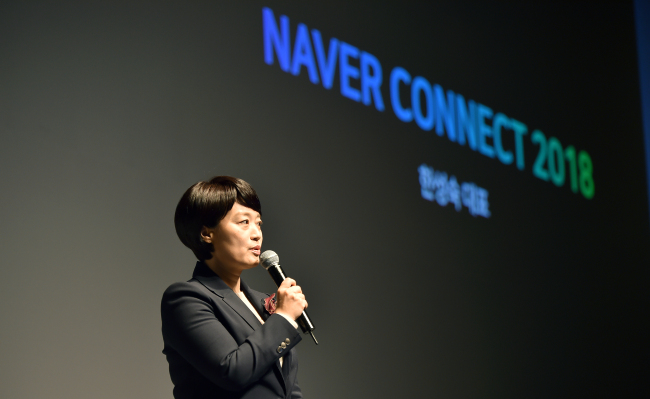Korea‘s largest search engine platform Naver is focusing its energies in 2018 on marrying its core business of search with the customizing capabilities of artificial intelligence, but there are many hurdles ahead, according to the company’s chief executive Wednesday.
At the annual Naver Connect 2018 conference, where Naver reaches out to creators and small business owners who operate on their platforms, Naver Chief Executive Han Seong-sook told reporters that the largest change to the company this year is the integration of its search team with its Clova team, which develops the AI platform.

Naver CEO Han Seong-sook speaks at Naver Connect 2018, held Wednesday at the Grand InterContinental Seoul Parnas. (Naver)
“Search was the core technology of Naver‘s identity, and now we have combined it with Clova to prepare for the next era,” she said. “This is an important place to start for us to go global.”
Naver wants to use AI to expand the ways in which search works. The engine recently added functions that allow users to search via images through their cameras and by voice. In addition, the company hopes to use past search histories to prioritize the search results users see when they use Naver -- a change that is set to come in the second half of the year.
AI will play a large role in the way clients interact with Naver as well. For sellers this year, Naver will be using their experience in AI to better analyze product photos and offer recommendations for tags, recommend related products and allow payments to be made through voice recognition. For content creators, Naver will be offering a “PRISM Live Studio,” allowing creators to stream their content live smoothly to a global audience.
Customization is undoubtedly one of the largest trends in search this year, but it comes with a host of new issues including those of revenue, the protection of personal information, and the rise of video-based searching on YouTube.
Like other major search engines, Naver’s business model depends on the types of traffic it can generate for its client businesses. Changing the way that customers see results will bring about major changes to the current model. For example, being able to use AI to give users surgically precise results may reduce traffic to other search results.
“The search environment is completely changing, so it‘s a serious question whether our business model will continue to work. There’s no answer yet,” Han said. “Still, there will always be demand for recommendations to a question beyond a simple clear answer, so we see that as an opportunity.”
In terms of personal information, Han said that the company is looking to pursue more transparency in the choices that users have in the types of information that can be collected by Naver and increasingly open the decision-making process to outside experts and users.
On the competition front, Han said that Naver is seeing a major threat in the rise of video-based searches, as Naver primarily provides image and text-based search results.
“We are seeing in their teens are using YouTube as their primary search engine, and that trend can solidify into a pattern. We are studying how we can explore video-focused searches for these users,” she said.
Han also noted Naver‘s relative weakness in providing video editing tools for the service’s users, and said that the company will likely release a new user-generated content platform by the end of the year.
The company also plans to invest heavily this year in creating video content that can be provided on the Naver platform. In particular, Han pointed to how-to videos as an in-demand category for searchers, in areas such as beauty.
She however declined to comment on an estimated budget for technical developments in AI, saying that various fields such as AI, autonomous driving and robotics were all merging together with “disappearing boundaries,” making it difficult to separate them from the company‘s point of view.
By Won Ho-jung(
hjwon@heraldcorp.com)






![[Graphic News] More Koreans say they plan long-distance trips this year](http://res.heraldm.com/phpwas/restmb_idxmake.php?idx=645&simg=/content/image/2024/04/17/20240417050828_0.gif&u=)